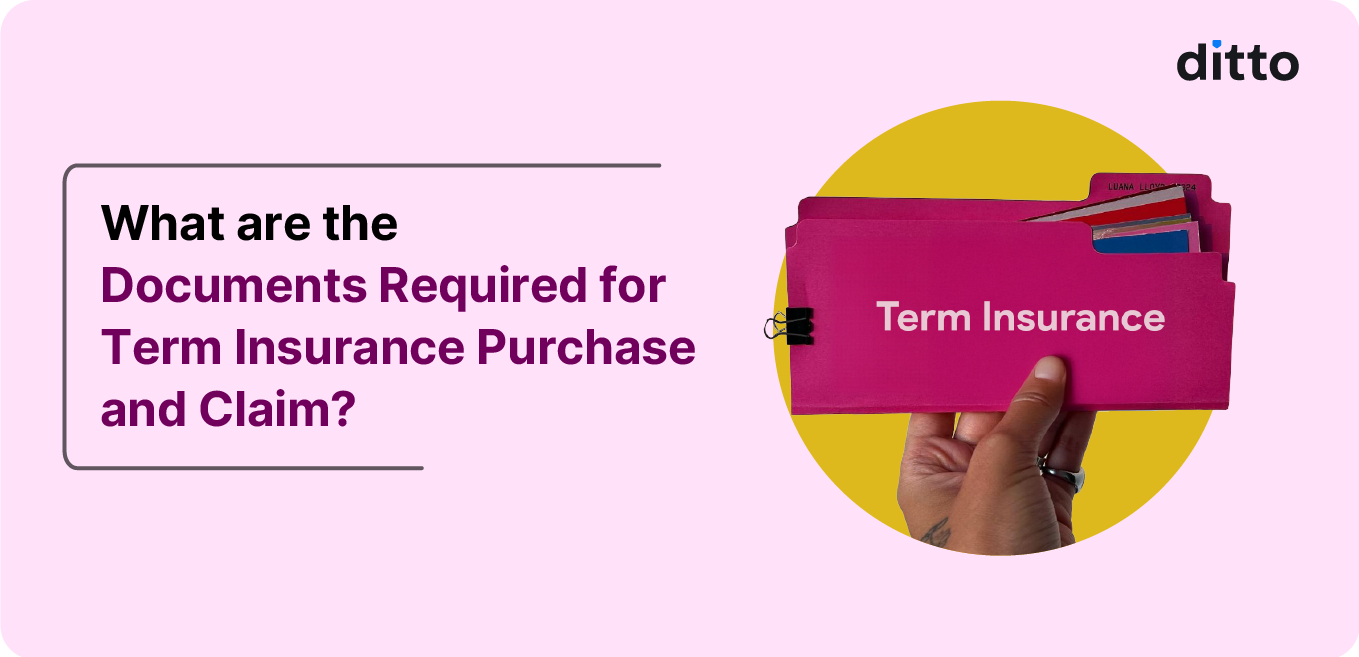What are the Documents Required for Term Insurance Purchase and Claim?
To buy term insurance, you need to submit KYC documents such as identity proof (Aadhaar, PAN, or passport), address proof (utility bill or bank statement), age proof (birth certificate or PAN), income proof (salary slips or ITR), and nominee details.
For claims, the nominee must provide the policy or e-policy, death certificate, claim form, ID, and bank details. Medical records are required for natural deaths, while accidental deaths need a police FIR and a post-mortem report.
Having all these documents in place ensures a smooth process from policy purchase to claim settlement.
Introduction
You need to submit some important paperwork when buying term insurance or when filing a claim. During such times, even a single missing document can cause inconvenience. That’s why at Ditto, we recommend keeping track of every detail to avoid delaying your policy approval or claim settlement process. Just a few uploads, quick verification, and you’re done.
In this guide, we’ll cover the documents required for term insurance purchase and claims so that you get faster approvals, smoother claims, and zero last-minute stress.
If you’re unsure which policy to choose, book a free call and our IRDAI-certified advisors will help you find the right policy with zero spam and complete transparency.
Which Documents Are Needed for Buying a Term Plan?
Here’s a quick checklist of the documents you’ll need based on your applicant type:
1. Individuals (Salaried)
- KYC: Aadhaar, PAN, Passport, Voter ID, or driving license
- Income Proof: Last 3–6 months’ salary slips, latest ITR or Form 16, 6-month bank statement showing salary credits, and offer letter with CTC breakup or company ID card
- Other Documents: Address proof (utility bill or bank statement), medical history (if asked), nominee details (name, ID, relation), and cancelled cheque or passbook
2. Individuals (Self-employed)
- KYC: Aadhaar, PAN, Passport, Voter ID, or driving license
- Income Proof: ITR with computation (last 2–3 years), 6-month bank statement, audited firm accounts, or CA certificate
- Additional Proofs: Rental income proof (rent agreement and receipts), fixed deposit or mutual fund redemption statements
- Other Documents: Address proof, nominee details, and cancelled cheque or passbook
3. Companies
- Business Proof: Certificate of Incorporation, PAN, MoA, and AoA
- Authorization: Board Resolution and Power of Attorney for authorized signatory
- KYC: ID, address proof, and photo of authorized person; Beneficial Owner declaration and KYC
- Financials: Company financial statements, if applicable
4. Partnership Firms
- Registration Proof: Firm Registration Certificate and PAN
- Income Proof: Audited accounts or CA certificate, ITR (if applicable)
- Other Documents: Partnership Deed, partner consent letter, ID/address proof, photo of authorized signatory, Beneficial Owner declaration, and KYC
5. Hindu Undivided Family (HUF)
- KYC: PAN of HUF and Karta
- Other Documents: HUF Registration Certificate (if available) and KYC of Karta (photo, ID, and address proof)
6. Trusts / Foundations
- Registration Proof: Trust Registration Certificate, PAN, and Trust Deed
- Authorization: Trustee consent letter
- KYC: ID, address proof, and photo of the authorized person, plus Beneficial Owner declaration and KYC
7. NRIs / PIOs / OCIs / Homemakers / Applicants Without Fixed Income
- KYC: Passport, PAN, or Overseas ID
- Income Proof: Foreign payslips or income certificate from employer (for NRIs), foreign bank statements showing salary credits
- Other Proofs: Certified English translations (if documents are not in English), spouse’s income proof (for homemakers), investment or SIP statements, or property income proofs
- Additional Details: Proof of residency or visa (for NRIs), bank account details (for payouts), nominee details, and KYC
Note: The above list is indicative. Insurers may ask for additional documents based on your profile, medical history, or the size of the cover.

Documents Required to File a Term Plan Claim
Natural Death (Illness, old age, or medical condition)
Policy document (not needed for e-policy), completed claim form, death certificate, nominee’s photo, cancelled cheque or bank passbook, nominee’s ID and address proof, PAN or Form 60. Employer’s certificate and the medical cause of death certificate from the doctor or hospital.
Unnatural Death (Accident, murder, or suicide)
Policy document (not needed for e-policy), claim form, death certificate, FIR copy, nominee’s ID/address proof, PAN or Form 60, nominee’s photo, and bank details. Inquest or panchnama report, post-mortem report (PMR), police final report or charge sheet, viscera report (if applicable), driving license (for road accidents), and any eyewitness report or newspaper clipping.
Death Due to Natural Calamities or Disasters
Death certificate (from government or disaster authority), claim form with NEFT details, policy document (not needed for e-policy), nominee’s photo, ID/address proof, PAN or Form 60, and bank details. Eyewitness statements or a local authority certificate declaring the person deceased if the body is not recovered.
Death Outside India
Embassy or consulate-attested death certificate, local police report or equivalent FIR, certified English translations of all documents, passport copy of the deceased, and proof of cremation or repatriation (if available). Country-specific documents as requested by the insurer.
Special Scenarios and Disputes
Standard claim documents as per the death type. Attested Will or Succession Certificate (for disputed nominees), legal or investigator reports in complex cases, and duplicate e-policies if originals are lost. Claims after three years (moratorium period) may need fewer checks.
Note: Verify that all entries in the claim form are correct and that nominee information matches the insurer’s records to ensure a smooth claim process.
What to Do if You Lose or Misplace Original Documents?
If you’ve lost your term insurance documents, don’t panic. Digital copies are now legally valid and accepted by insurers, especially for policies issued after 2020. Under the IT Act, 2000, e-documents and e-signatures hold the same legal status as physical ones.
You can easily download duplicates through your insurer’s customer portal or access them anytime on DigiLocker, the government-approved digital storage platform. For KYC, Aadhaar-based e-verification or video KYC works just as well.
During claims, clear scanned copies of ID, address, and medical or death certificates are usually sufficient. Even if the physical policy is lost, your digital copy or its printout is valid for verification and claim settlement.
Why Choose Ditto for Your Term Insurance?
At Ditto, we’ve assisted over 8,00,000 customers with choosing the right insurance policy. Why customers like Aaron love us:

- No Spam & No Salesmen
- Rated 4.9/5 on Google Reviews by 15,000+ happy customers
- Backed by Zerodha
- 100% Free Consultation
You can book a FREE consultation. Slots are running out, so make sure you book a free call now!
Ditto’s Take on Documents Required for Term Insurance
Keeping your documents organized makes your term insurance journey simple and stress-free. Here’s how:
- Having your documents ready speeds up approval and gets your policy issued without any hassle.
- When all claim papers are ready, your nominee can get the payout smoothly and on time.
- The documents required may change for natural deaths, accidents, or NRI claims, so always keep your records updated and digital copies safely stored.
Frequently Asked Questions (FAQs)
Which income proof is required for term insurance?
It depends on your employment type. Salaried applicants need 3–6 months’ salary slips, Form 16, and recent ITRs or bank statements. Self-employed individuals can provide 2–3 years’ ITRs or audited accounts, while homemakers may use their spouse’s income or bank/SIP statements as proof.
How to submit documents required for term insurance purchase?
You can submit your documents online through your insurer’s portal during the application process. Most insurers now accept scanned or digital copies verified via Aadhaar-based e-KYC or video KYC. For offline applications, you can provide self-attested photocopies at the insurer’s branch or through an advisor.
Can I buy term insurance without proof of income?
Yes, some insurers accept alternate proofs like business invoices, ledger statements, or a spouse’s income. However, providing valid income proof helps with faster approval. With Aadhaar-based e-KYC, physical documents are often not required.
Is Aadhaar enough to buy term insurance?
Aadhaar works as a valid ID and address proof, but insurers also need PAN or Form 60 for compliance. For higher covers, PAN is mandatory. Submitting Aadhaar and PAN together completes your KYC.
Do I need to submit originals, or are photocopies enough?
No, scanned self-attested copies are enough for online applications. Originals are rarely needed except during claims. However, keep your originals safely stored in case the insurer or bank requests them later during claim processing.
Last updated on:









